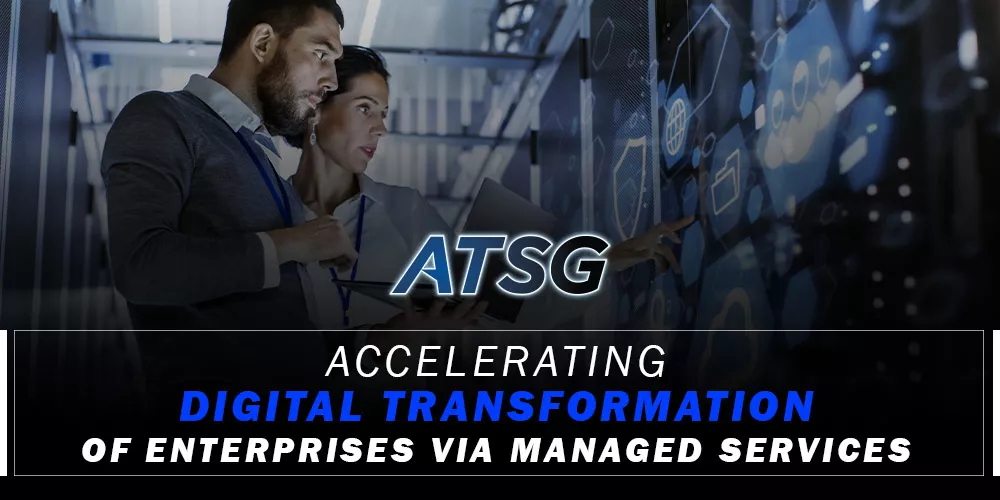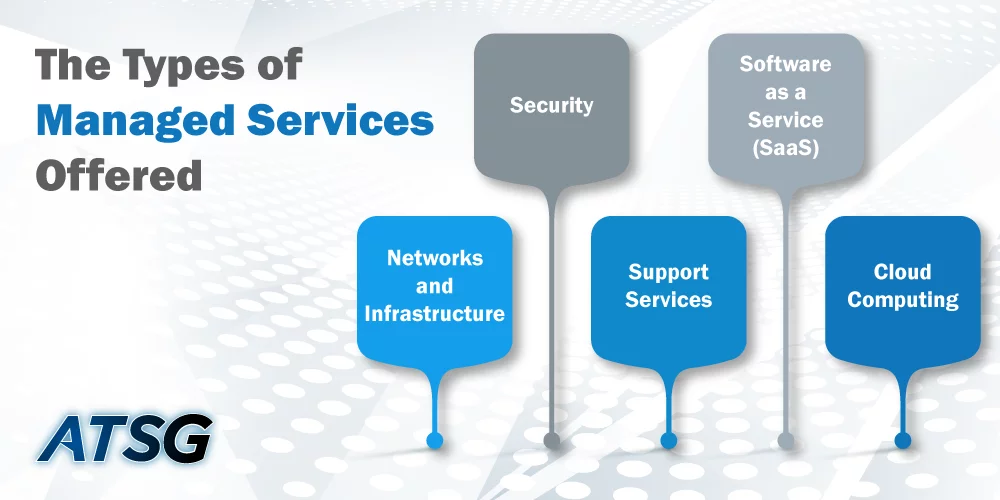Organizations have faced increasing pressure to advance their digital transformation initiatives. According to market intelligence company International Data Corporation (IDC), two-thirds of the globally surveyed 2,000 chief executive officers will have digital transformation as their central corporate strategy.

The ideal transformation leads organizations to lower cost expenditure and higher customer satisfaction. However, it is vital to leverage the unique capabilities offered by managed services and service providers like ATSG, to facilitate as well as accelerate successful digital transformation.
Defining Managed Services
Managed services are the practice of outsourcing day-to-day technology management responsibilities to a third party as an organization-wide strategy. These methods can be used for improving operations and jacking up the Return on Investment (ROI).
Managed services bring a new face and definition to the concept of technical outsourcing in the management and content service industries. Strategically, managed services help maintain, enhance, develop, automate and optimize key organizational processes.
Managed Services Being Deployed Across Every Enterprise
Before the world changed in 2020, organizations were trying to uphold certain technology trends. The pace of evolution sped up, digital transformation redefined every organization’s corporate requirements.
During this entire evolution, a stage was reached when improving IT teams and infrastructure within the organization became less rewarding for the enterprise. Thus, many organizations began to shift to cloud solutions and managed services for key areas in the business.
According to statistics, the cloud computing market had reached $495 billion by the end of 2022. This gave organizations that deployed cloud solutions, the room to optimize their business needs. It enabled in-house IT experts to plan, design, and implement innovative technologies across the organization to create a true difference within the competitive market.
On the other hand, the more repetitive, structured processes were given over to Managed Services Providers (MSP). They had both the specialization and the resources to carry out those processes much more efficiently.
The Influence of Managed Services on Enterprises
MSPs possess the capability to address multiple challenges, whether it’s lacking IT skillsets or talented recruitment. Managed service providers jump in to “save the day” for organizations. MSPs give unique support and advice to companies, driving digital transformation. They help organizations navigate better processes, connect more seamlessly and work efficiently.
MSPs like ATSG are recognized for their effective solutions. ATSG Optanix was declared a Leader in Gartner® Magic Quadrant™ for Managed Network Services in 2022, along with other technology solutions it offers.
In a hyper-competitive environment, MSPs enable organizations to outsource technology solutions to accelerate digital transformation. They provide the opportunity to give value-added services and core infrastructure to become “true business partners”.
The Types of Managed Services Offered
Evolving with emerging technologies, meeting industry standards and regulations, and exceeding customer expectations, are just some of the ways enterprises can set themselves apart from the competition.
To achieve these challenging feats though, organizations must have the “digital agility” to keep up with the market. There are multiple areas that require management services, here is a list of some:-

Networks and Infrastructure:-
Managed services cater to enterprise networks and infrastructures, which helps in-house IT teams to avoid wasting time in setting those up. This reduces the costs for Wide Area Networks (WAN), Local Area Networks (LAN), managed gateways, and automated network support, helping organizations become more cost-efficient.
Security:-
Many security solutions are being offered by managed service providers, which offer robust protection against ransomware or malware attacks. Managed services offer application compatibility that ensures that software and hardware are well interlinked. Anti-malware is imperative software that avoids unauthorized access, hacks, and the stealing of confidential data. Moreso, managed services can timely update software to their most current and patched versions, and ensure full protection.
Support Services:-
Utilizing IT support services can decrease administrative waste. Implementing support requirements and service provision makes an organization efficient within the market. Moreover, support-managed services can help elevate the employee experience and financial efficiency.
Software as a Service (SaaS):-
Organizations become more productive when they utilize software-as-a-service (SaaS) solutions. This specialized software can customize and advance software-related organizational needs. The major advantage of SaaS is a refined tool(s) that can optimize performance and save time.
Cloud Computing:-
Cloud service providers (CSP), such as ATSG Cloud, involve operating systems, storage, and networks that are a part of providing managed IT resources. This can help the organization streamline its cloud infrastructure according to its workloads, applications, and databases. Furthermore, cloud infrastructure enables enterprises to give employees ample time to focus on core tasks.
The Future of Managed Services with Digital Transformation
With the pandemic accelerating our technology evolution, businesses had to implement digital transformation mechanisms across the organization. Managed services enable organizations to encompass successful transformation methods. The synergy between managed services and digital transformation has essentially improved the production and efficiency of businesses.
The duo has encouraged innovative methods and people–centric strategies, leading enterprises toward the growth of the business. Due to the customization of managed services, organizations can add or subtract software that best fits their requirements. This enables businesses to personalize their transformation, and move towards competitive market growth.
Conclusion
Businesses, small or large, need technology and automation to grow, streamline their processes and compete in the digital ecosystem. However, what truly drives the enterprise towards digital success is advancing in managed service technologies.
Managed services and tools like cloud infrastructures, mobility services, data banks, etc. can encourage and accelerate business growth. Managed Services providers, like ATSG, come up with versatile solutions that cater to business requirements and provide the requisite tools that would advance managed services. MSPs help organizations advance their strategies with expert advisory services. Managed services are the gateway to achieving a digital transformation vision.




